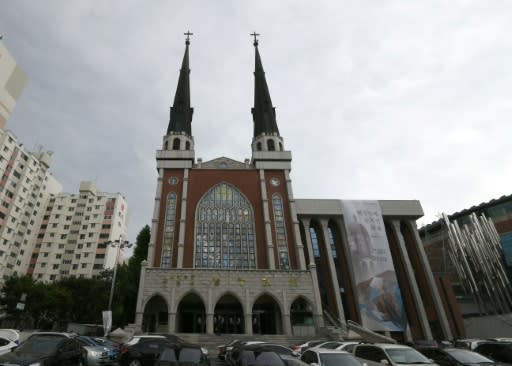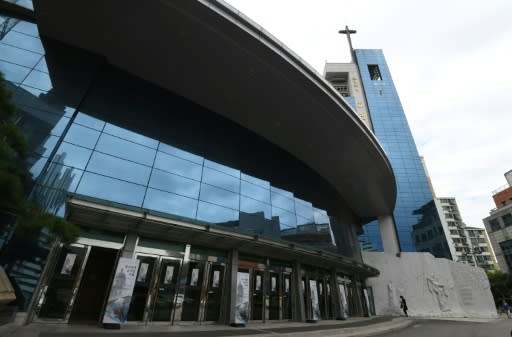In the Name of the Father: unholy row over Seoul church inheritance
One of the world's largest presbyterian churches has been engulfed by an unholy row after its pastor sought to pass the super-rich South Korean institution into the control of his son. Religion remains a powerful social force in the South, and the country's biggest spiritual organisations are wealthy and influential. More than a dozen Seoul megachurches boast luxurious, sprawling buildings, congregations in the tens of thousands, and millions of dollars in annual revenues from worshippers -- some donate as much as 10 percent of their income -- and commercial activities. Their leaders enjoy status and perks, lucrative posts at church-affiliated foundations, and political heft. And the biggest of all the presbyterian churches is Myungsung. Founded by pastor Kim Sam-whan 40 years ago in a then-marginal neighbourhood in the east of the capital, it now has a large main building with dark twin spires reaching up to the heavens, and 100,000 members. It operates an evangelical television channel, two hospitals in South Korea and a medical centre in Ethiopia, two schools and a kindergarten, a six-storey conference and wedding venue, and welfare and educational facilities across the country. But when Kim, 73, sought to pass that worldly empire on to his 45-year-old son Kim Ha-na with his ascension to chief pastor, it set off fire and brimstone. - Lost Seoul - Protestantism is South Korea's largest faith, accounting for some 22 percent of the population, followed by Buddhism with 21 percent and Catholicism with seven percent, according to a 2014 survey. About half of the population are non-believers. The first South Korean megachurch to be inherited by its founder's son was the Chunghyun Presbyterian Church in 1997, and several more followed suit in subsequent years, triggering mounting public criticism. Comparisons were drawn with the generational successions at the chaebols, the family-controlled conglomerates that dominate the South Korean economy. In the end the umbrella Presbyterian Church of Korea (PCK) amended its constitution to ban such hereditary successions in 2013. Critics of the Myungsung move took the Kims to a church court, but it ruled 8-7 in their favour, finding that as the father had officially retired two years earlier, it was not a direct succession and therefore legitimate. The move has echoes of how Vladimir Putin served two terms as Russian prime minister before returning to the country's presidency, avoiding restrictions on term limits. But the decision only fuelled the dispute, with 900 pastors holding a protest meeting, theology students boycotting classes, and news portals flooded with critical comments. "He considers the church his own asset and he is unable to hand it over to anyone but his own son," read one. The Kims were trying to "privatise" a church, Kim Ji-chul of Somang, another megachurch, told the protest, calling on them both to resign. "A pastor is needed for a church but a church is not needed for a pastor," he said. "If this principle is reversed, the church will be corrupted." - The devil inside - In response, a PCK general meeting overturned the church court ruling, sacked all 15 judges involved, and decided to review the case from scratch. Pastor Yu Kyung-jae at Andong Church expects a new PCK court to rule the Myungsung transfer invalid, but said there was "little possibility" the church would cancel the succession, leaving the situation deadlocked. The elder Kim, Yu said, "does not want to lose his grip on the church and give up influence and material gains". "We will continue seeing discord and friction around megachurches in this country which have been focusing on material expansion," he predicted. "You cannot serve both God and Mammon." Myungsung insists that the son's appointment was appropriate. "The appointment was made in the most democratic and legitimate manner... and most congregants approved," spokesman Kim Jae-hoon told AFP. And the founder remains defiant. "This is not like bequeathing a business but passing on a burden of sacrifice and pain," Kim Sam-whan told followers at a prayer session last week. Adopting Biblical imagery, he accused his critics and opponents of "trying to kill us by possible means, to stone us to death". "Devils are attacking us." Religion remains a powerful social force in South Korea, and the country's biggest spiritual organisations are wealthy and influential When Kim Sam-whan, the founder of Myungsung church, sought to hand leadership down to his son, it set off fire and brimstone Presbyterian churches in South Korea have been compared to chaebols, the family-controlled conglomerates that dominate the economy




